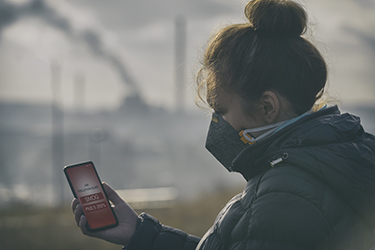Speakers from four organizations came together to discuss ways in which partnerships can be useful in creating healthier environments in equitable ways during Tuesday’s APHA 2022 session “Partnerships and Their Role in Advancing Environmental Health.”
Amanda Reddy, executive director of the National Center for Healthy Housing and co-chair of the National Environmental Health Partnership Council, said the council brings diverse stakeholders together to build a collective voice in support of health issues, foster and coordinate activities to advance environmental health, communicate new environmental information, and research and build greater awareness of the role environmental health plays in sustaining and promoting human health.
“We leverage partnerships so we can all speak with one voice and allow people to live in a healthy environment,” Reddy said.
Reddy underscored the fact that environmental health is related to many things and that organizations and individuals need to collaborate rather than work separately.
“I remember going to a series of partnership council meetings and they kept just talking about ‘PFAs, PFAs’ like it was coming up in drinking water,” she said. “It would have been easy for me to say, ‘Oh, I’m in housing, that’s not my lane,’ but of course drinking water comes into people’s homes. Within a week of one of those meetings where we had a detailed session on just understanding the science behind that, we started getting media calls at my organization about what our response is and what the role of housing is (in environmental health).
“The background that I was able to get out of that partnership council meeting really helped me to participate in not only responding to those questions, but getting reporters connected to the real experts who were taking the lead on that message,” Reddy continued.
Nsedu Obot Witherspoon, with the Children’s Environmental Health Network, said that it is important for organizations to look at the organization as a whole, as well as the individuals who comprise the organization, and be committed to diversity and equity.
“How are we standing up, leading and really advancing equity and justice in the environmental space?” Witherspoon asked. “It’s about getting together, sharing ideas and learning from each other.”
Shashawnda Campbell, with the South Baltimore Community Land Trust, said residents of South Baltimore live in close proximity to a waste incinerator. Her organization is urging city officials to embrace a zero-waste policy rather than what Campbell called “the racist, failed waste system” that Baltimore has.
She said health outcomes are measurably worse in the community near the incinerator. Residents in South Baltimore have rates of asthma that are 40% higher than the rest of Baltimore.
“We need to step away from a system that is literally killing us,” Campbell said. “Clean air is not something you ‘deserve;’ it’s something that should just be given.”
Natasha DeJarnett, with the University of Louisville and the Environmental Health and Equity Collaborative, said the collaborative’s Workforce and Education Committee is striving to address goals that support a robust and diverse environmental health workforce as well as to celebrate achievements. The collaborative does that by presenting an Inclusion and Diversity for Equitable Advancement in Environmental Health Award.
“Organizations that are nominated for the IDEA EH Award demonstrate leadership in creating innovative activities, providing evidence of their continued commitment to diversity in the workforce or forming organizational partnerships,” DeJarnett said.
She then presented the 2022 IDEA EH Award to Backyard Basecamp, a Baltimore nonprofit led by people of color that serves historically vulnerable communities by improving the environment and increasing access to outdoor spaces. The organization has already undergone a 10-acre land reclamation project to transform unused and abandoned land into parks, community gardens and other green spaces.
Photo by Humonia, iStock-1084561778.